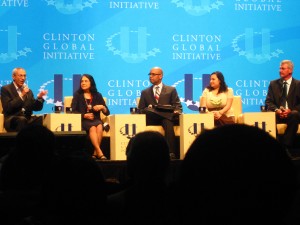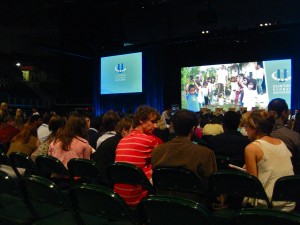
by Allison Woods | Apr 23, 2010 | News Slider
Clinton Global Initiative University brings college students together to discuss the problems plaguing the modern world. This year’s conference was April 16-18 at the University of Miami. John Podesta, president and CEO of the Center for American Progress, moderated a panel on change in the American community. The Center for American Progress’ Campus Progress has a web magazine covering the issues important to college students and allowing their voices to be heard. And these were the types of initiatives discussed during this panel. A variety of panelists spoke about their causes and the importance of community change, starting where you live. Marisol Becerra — a Chicago college student — worked with an environmental justice organization called Little Village while still in high school. As a college student, she raises awareness in her community about pollution and toxins emitted by local factories. Tim King started an all-boys public school in 2002 called Urban Prep in downtown Chicago. His goal was to address the college education rates for African-American young men. One in 40 African American men will complete college, he said, but Urban Prep has a 100 percent acceptance rate into college for its students. “We don’t want college to be a way to get out of the hood,” King said. “We want it to be a way to come back and work to fix the hood.” Bob Dixson, the Mayor of Greensburg, Kan., spoke of what has happened in the rebuilding efforts since his city was flattened by a tornado in May 2007. In rebuilding, the city is using all green technology and sustainable methods. “Green to me meant 1968, tie-dye shirts,...

by Allison Woods | Apr 23, 2010 | News Slider
Clinton Global Initiative University brings college students together to discuss the problems plaguing the modern world. This year’s conference was April 16-18 at the University of Miami. The Clinton Foundation started Clinton Global Initiative for world leaders to gather and address common issues, and three years ago a conference was added to include college students and their concerns. Former President Bill Clinton started Clinton Global Initiative University to bring college students together to address global issues through commitments to action. Groups submit projects aimed at tackling pressing issues, either in their community or even globally. The Wal-Mart Foundation provides grants for projects in conjunction with the conference. Projects can be submitted in five areas: education, environment and climate change, peace and human rights, poverty alleviation and public health. The highlights of the weekend were the plenary addresses, each on a specific topic. Clinton opened with his address on social imagination and innovative leadership. “The most important thing is an idea and a strategy to implement that, turning good intentions into positive changes,” Clinton said. Clinton said he is aware of the gap between what the private sector can do and what public institutions can provide. And trying to figure out how to fill the gap is a major reason for Clinton Global Initiative University. “The goal is to create global networks for the public good by private citizens,” Clinton said. “You aren’t intimidated by complexity,” Clinton said, noting how he believes college students can make the difference. Surgeon General Regina Benjamin then describe how she was influenced to practice medicine by working her way through college, providing health care in a small clinic in her hometown of...
by Allison Woods | Apr 15, 2010 | News Slider
Singarama is considered one of the biggest student-run productions of the year, and it’s definitely the highlight of the spring semester for many students. Though three main groups comprise the shows of Singarama, the hosts and hostesses are featured before and after each group performance. This year’s hosts and hostesses were Josh Britt, Zack Green, Carter Hamric, Joe Muchmore, Mallory Haynes, Allison Lancaster, Carter Martin, and Mariel Bolton. This is quite an eclectic group in the way of Singarama experience. Some have experienced what it’s like to be a host before, while others have participated in a group segment before. For some this is their first chance to step on the Singarama stage. “I love how different all of the hosts and hostesses are, but we have all bonded and really enjoy performing together,” said Carter Martin, a junior American studies major from Murfreesboro, Tenn. Martin joined the hosts and hostesses after having a lead role a group show last year. Singarama has always been about a diverse group of students putting on a great show in a relatively short amount of time. Anyone who has participated in Singarama before is familiar with six hour practices and late night set painting, but when the lights go up and the competition begins, all the hard work pays off. While the hosts and hostesses have no competitive edge, they know the joys and sorrows of leading the show. “Being a Brady Bunch character for a day takes the cake,” said Mariel Bolton, a sophomore art and English major from Cookeville, Tenn. “I got to wear a blonde hippy wig and scamper...
by Allison Woods | Mar 3, 2010 | News Slider
John Seigenthaler and Howard Gentry Jr. — two Nashvillians who were instrumental in the civil rights struggle — spoke to Lipscomb students as part of the observance of Black History Month. Seigenthaler, former editor and publisher of the Tennessean, worked as an adviser to Robert Kennedy and also covered the civil rights strugglet throughout the South. He was present at many of the sit-ins and white reactions. Growing up on the other side of the issue, Seigenthaler said he had to be educated on the struggles of African-Americans. “Martin Luther King had to expose it however he could and he had to dramatize it,” Seigenthaler said. He spoke of the freedom riders and Diane Nash leading the sit-ins in Nashville. He recalled the Ku Klux Klan attack in Alabama, perhaps the worst reaction of the nonviolent protests by African Americans. In Montogomery, Ala., Seigenthaler was hit in the head with a pipe and rushed to the hospital. Seigenthaler was with Robert Kennedy when he made his famous speech announcing the death of Martin Luther King, Jr. He remembered being the note taker when the two men first met. Gentry, the first African-American to be Vice Mayor of Nashville, grew up in segregated Nashville. His youth was filled with separate water fountains and second-hand textbooks. He was not allowed at the public swimming pool. Gentry said that his parents were the hopeful voice in his life. They taught him patience and hope for the future. He even remembered talking about John Seigenthaler in his home growing up. “There were people in the world that cared. And we will overcome, and they will help...
by Allison Woods | Mar 2, 2010 | News Slider
The Institute for Sustainable Practice’s new lecture series sheds light on Tennessee’s Land Trust and the protection of our state parks. The Sustainability Leadership Lecture Series started Feb. 16 in the Axel Swang Business Building with the first panel addressing land and parks in Tennessee. This discussion is the first of 11 on the topic of “The Conservation Legacy of the Bredesen Administration.” The three panelists, who worked directly on the project, came from very different backgrounds but brought their expertise. Their efforts earned the Gold Medal Award in 2007, naming Tennessee State Parks the best in the nation. When Gov. Phil Bredesen took office in 2003, 14 state parks had been closed to the public. Within the year, he opened them all back up and made them free access. Environment and Conservation Commissioner Jim Fyke and his wife even visited all 53 parks in the state that same year. Fyke pointed out that the governor secured local parks Shelby Bottoms and Beamon Park. His efforts also acquired Grassmere, saving the Nashville Zoo. “He doubled what Nashville had,” Fyke said. There are now 108 public parks in the Nashville area. The closest to Lipscomb’s campus is Radnor Lake, with six trails surrounding the lake. Environmentalist John Noel is working on the project as well. “Tennessee is the most biologically diverse inland state,” said Noel. Noel stressed the importance of taking care of our planet and using natural energy. Noel referenced Rachel Carson’s Silent Spring as a motivator for the government’s responsibility to the environment. The 1962 book is credited with starting the “green” movement and led to the ban...




